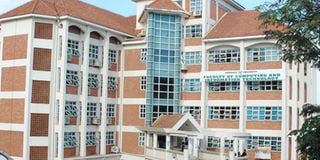How Makerere captured lofty place in rankings

CRUCIAL FACULTY: Makerere University’s Faculty of Computing and Information Technology has played a crucial role in the university’s rise in Webometrics rankings.
What you need to know:
Acting university vice chancellor, Prof Venansius Baryamureeba told Daily Monitor that Makerere will be among the top ten in Africa when the next rankings are released.
Kampala
Webometrics’ latest rankings for the world’s top universities show that Makerere University is now the top-rated higher learning institution on the continent outside Egypt and South Africa.
The rankings are based on the visibility of a university on the Internet, the volume of its research publications, and the general impact of the information published on its web pages. Makerere is now ranked 15th on the continent, 44 places above their ranking two years ago.
When the rankings were first released, university authorities criticised them, saying most of their publications do not make it onto the internet.
Authorities also reacted by setting up a committee headed by the director of ICT support, to come up with appropriate solution to improve its presence on the web.
The committee observed that for Makerere University to score highly, it’s web presence should be on a continuous basis.
It issued a document which proposed immediate (tactical) and intermediate (strategic) measures that will ensure an adequate web presence and subsequent higher ranking. “Whereas Makerere might be performing much better than other institutions in both academic and research terms, as long as the outputs are not disseminated online, her ranking is bound to suffer,” the committee noted in its report.
Acting university vice chancellor, Prof Venansius Baryamureeba told Daily Monitor that Makerere will be among the top ten in Africa when the next rankings are released.
“We have put lecturers’ publications and students’ dissertations online,” Prof. Baryamureeba said. “We shall make sure that students have web pages and blogs to facilitate interactions online.”
The domain approach
The committee, which was set up to study approaches to increase the University’s ranking noted that the domain makerere.ac.ug is an alias of the primary domain mak.ac.ug.
This implies that when one types makerere.ac.ug into a browser, the request is redirected to see the contents of mak.ac.ug.
To resolve this, the university adopted a shorter domain to facilitate creating sub domains for various units that are used for email addressing and websites.
However, the university agreed to continue to maintain makerere.ac.ug for historical reasons and name recognition of the Makerere brand. This explains the bigger number of pages indicated under mak.ac.ug compared to makerere.ac.ug. In terms of number of pages, Makerere has now outcompeted Dar-es-Salaam, but still does poorly in comparison to Cape Town.
“While Makerere’s mak.ac.ug domain is comparable to Dar-es-Salaam’s udsm.ac.tz in terms of size, her ranking woes in the past have been compounded by the fact that Webometrics until recently used only makerere.ac.ug for ranking purpose
Prof. Baryamureeba said: “We have made efforts to put all websites which are part of Makerere on the Makerere domain. We must ensure that all faculties and other academic units have websites which are linked to the main Makerere domain.”
The committee also observed that, “The number of pages that make up the University’s online presence is critical because it directly affects size indicators used by Webometrics which accounts for 20 per cent of the ranking. In addition, the number of pages indirectly affects the visibility indicator, since the more pages a domain has, the more inlinks that it is likely to receive into these different pages. Visibility accounts for 50% of the ranking.”
Other measures that have helped improve the rankings, have been to review of the web templates and design guidelines, creation of an archive and publicising Makerere’s historical data, as well as listing library OPAC in Open World Cat.
Rankings and quality
The ranking is considered an indicator of the impact and prestige of the university and its commitment to disseminating research outcomes.
However, the ranking does little to reflect the quality of academic performance of other players like students. Even scholars like Prof Baryamureeba admitted the ranking might not be 100% accurate.
“It is not 100% accurate but it gives you the quality of research at the institution,” Prof Baryamureeba said.
“When you look at Massachusetts Institute of Technology and Harvard University which are ranked to be the best in the world, there is a lot of online interactions, and they publish all their documents, workshop reports and research online.”




